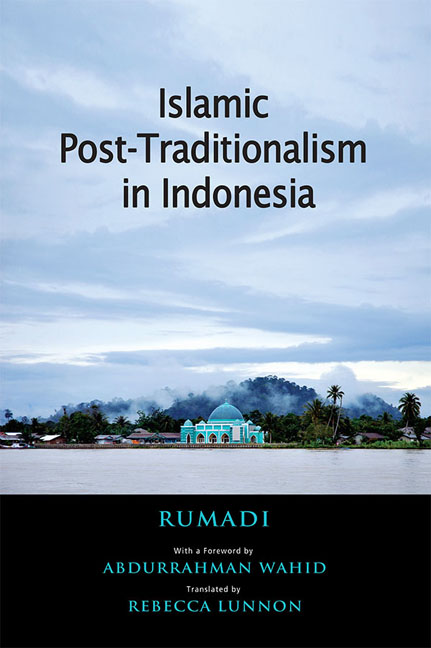3 - NU and the Islamic Post-Traditionalist Discourse
Published online by Cambridge University Press: 20 May 2017
Summary
THE LANDSCAPE OF THE ISLAMIC POST-TRADITIONALIST DISCOURSE
Islamic post-traditionalism is still debated, both the term itself and the substance of the concept. The term “post-traditionalism” is uncommon; not only is it not found in the dictionary, the prefix “post” attached to the term “tradition” suggests passing, surpassing, discarding, and abandoning tradition. However, the soul of the movement is actually about transforming and revitalizing tradition, not abandoning it. Meanwhile, the substance and discourse of thought that has developed is often considered unclear and as if to simply emphasize the traditional identity of the educated NU community.
The absence of the term in dictionaries is not a reason to not use the term. Dictionaries are constructions from reality, and thus the absence of a term from the dictionary is not a valid argument to suggest that the phenomenon it describes does not exist. In addition, if we interpret the term “post” as surpassing or abandoning tradition, this is not very satisfactory, because the term “post” also contains an understanding of continuity and change. However, the accusation concerning the substance of the concept does indeed require serious thought. Those who coined the term must be able to prove that post-traditionalism is not just a continuation of the tension between the traditionalists and modernists using more sophisticated and theoretical tools, but is indeed the result of a long struggle of intellectual transformation. This community did not emerge out of the blue, but through an intellectual struggle with quite a deep traditional consciousness — traditional in both the sense of behaviour but also in the sense of a vast wealth of thought.
The emergence of this community can be traced back to when NU declared its return to the Khittah of 1926 in 1984. Besides the various interpretations of the Khittah of 1926, the moment opened up sufficient space for NU members to form a new group oriented more towards intellectual development. Abdurrahman Wahid was the determining force behind this emerging passion of NU intellectualism. Although this led to tension with senior ulama as a result of this group's intellectual “mischief”, the presence of Abdurrahman Wahid with his intellectual capital and blue blood protected this “naughty” or “mischievous” group and eased tension. Nevertheless, in comparison to the number of NU members, this group was very small and often exposed to extraordinary political temptations.
- Type
- Chapter
- Information
- Islamic Post-Traditionalism in Indonesia , pp. 95 - 168Publisher: ISEAS–Yusof Ishak InstitutePrint publication year: 2015

